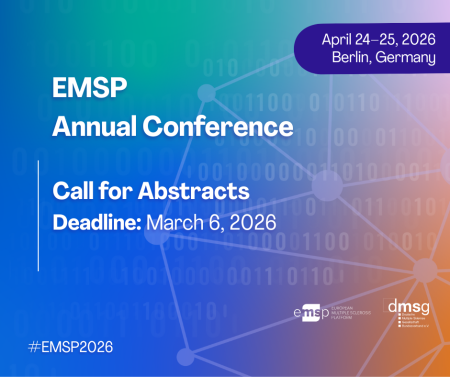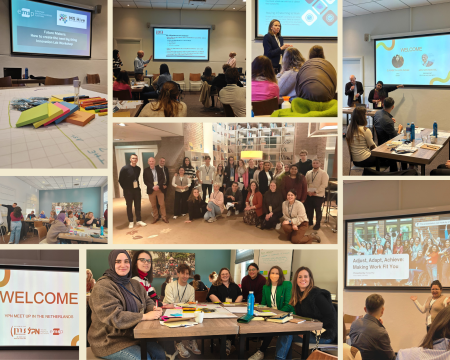
Joint Educational Session at ECTRIMS 2025: Exploring the Role of EBV in MS with BEHIND-MS and EBV-MS Consortia
22.08.2025The 2025 edition of the ECTRIMS Congress, taking place in Barcelona from 24 to 26 September, will feature an educational session dedicated to one of the most pressing topics in multiple sclerosis (MS) research today: the role of Epstein-Barr Virus (EBV) in the development and progression of MS.
Titled “Epstein-Barr Virus in Multiple Sclerosis: Where are we? Where should we go?”, the joint educational session will be held on 24 September from 8:30 to 9:30 AM and is co-chaired by Dr. Jan Lünemann (University of Münster) and Dr. Marianna Cortese (Harvard T.H. Chan School of Public Health). This session represents a joint initiative between the BEHIND-MS and the EBV-MS projects, two EU-funded research consortia working in close coordination to advance the scientific understanding of EBV-related mechanisms in MS.
Why This Research Matters
A recent landmark study in 2020 showed that almost every person who develops MS may have had a prior infection with EBV, a common virus that infects most people in early life. These findings have elevated EBV from a suspected contributor to a central target in MS research, prompting urgent efforts to unravel how and why the virus plays such a pivotal role.
The BEHIND-MS and EBV-MS projects are at the forefront of this scientific movement. Their shared goal is to move beyond association and uncover the mechanistic links between EBV and MS: how the virus might trigger or sustain autoimmune responses, why certain individuals are more vulnerable, and whether EBV-targeted strategies can prevent or treat MS.
What’s the hope?
The outcomes of these projects could be transformational for MS research and care. Potential future breakthroughs include:
- Vaccines against EBV to prevent MS from developing in high-risk individuals
- A better understanding of the mechanism in which EBV may contribute to MS and consequently, the development of immune therapies that target EBV-infected cells or viral proteins, offering a novel way to slow or stop disease progression
- Risk prediction models that integrate EBV-related biomarkers to identify individuals at higher risk before symptoms appear
- New potential prevention strategies that reduce MS incidence by intervening in early EBV-related immune processes
For patients, this could mean fewer diagnoses in the future, improved treatment options, and possibly even avenues for halting disease before it starts. For healthcare professionals, it opens a new dimension of personalised care and evidence-based interventions rooted in a deeper understanding of MS pathogenesis.

From left to right: Drs. Jan Lünemann, Marianna Cortese, and Øivind Torkildsen
Scientific Programme
This interdisciplinary joint session at ECTRIMS aims to foster collaboration and alignment in EBV-related MS research. It will feature presentations from leading experts in the field:
- Dr. Marianna Cortese (Boston), representing the EBV-MS consortium, will present: “EBV in MS: Guilty by association? Insights from epidemiological studies”
- Prof. Jan Lünemann (Münster), representing the BEHIND-MS consortium, will discuss: “Immune control of EBV infection: What is different in people with MS?”
- Prof. Øivind Torkildsen (Bergen), representing the EBV-MS consortium will address: “Targeting EBV infection for treatment and prevention of MS: Fact or fiction?”
From left to right: Drs. Jan Lünemann, Marianna Cortese, and Øivind Torkildsen
The session will conclude with a panel discussion examining current evidence on EBV as a causal factor in MS and the potential of EBV-targeted immune strategies to reduce disease susceptibility and progression. The discussion will also consider implications for prevention and treatment.
Integrating the Patient Perspective in EBV-Related MS Research
As research continues to uncover the links between EBV and MS, it is essential to ensure that scientific progress remains grounded in the realities of those living with the disease. Both the BEHIND-MS and EBV-MS projects recognise the importance of integrating patient perspectives into the research process.
Involving people with MS from the earliest stages of research – including study design, communication, and dissemination – enhances the relevance, quality, and real-world impact of scientific outcomes. Meaningful patient engagement ensures that research is informed by lived experience, grounded in patient priorities, and contributes to more equitable and person-centred approaches. In the EBV-MS project, structured consultations with people affected by MS are guiding key aspects of the clinical trial design, ensuring that the patient perspective is embedded throughout the process. Similarly, both the BEHIND-MS and EBV-MS consortia have included people with MS on their advisory boards, ensuring that patient insights play a central role in shaping strategic and scientific directions.
The European Multiple Sclerosis Platform (EMSP) is a partner in both consortia, working to ensure that people with MS are meaningfully involved throughout the projects and that research progress is not only communicated back to the community, but also that people with MS have opportunities to engage directly with researchers, ask questions, and contribute to shaping the direction of the work, fostering a genuine two-way dialogue. By embedding patient perspectives into EBV-focused research, the consortia aim to enhance the clinical relevance of findings and support the development of strategies that are both scientifically robust and aligned with patient needs. Engaging people with MS is not a one-time activity but an indispensable, ongoing process that spans the entire research lifecycle from identifying research priorities and shaping study design to interpreting results and ensuring meaningful dissemination. This continuous engagement fosters mutual trust, improves study feasibility and acceptability, and ultimately ensures that research outcomes are more likely to translate into interventions that are impactful, accessible, and truly reflective of what matters most to those living with MS.
Join the Discussion
We invite clinicians, researchers, and healthcare professionals attending ECTRIMS 2025 to take part in this session and contribute to a vital conversation on one of the most rapidly evolving areas of MS research.
For programme updates and registration, visit: www.ectrims.eu/ectrims2025
For more information on the EBV-focused consortia, BEHIND-MS and EBV-MS, please refer to their respective websites: https://www.behind-ms.eu/en and https://www.uib.no/en/ebvms
The BEHIND-MS project has received funding from the European Union’s Horizon Europe Research and Innovation Actions under grant no. 101137235 (BEHIND-MS) as well as the Swiss State Secretariat for Education, Research and lnnovation (SERI). The EBV-MS project has received funding from the European Union’s Horizon Europe Research and Innovation Actions under grant no. 101136991 (EBV-MS).
 Your Account
Your Account


